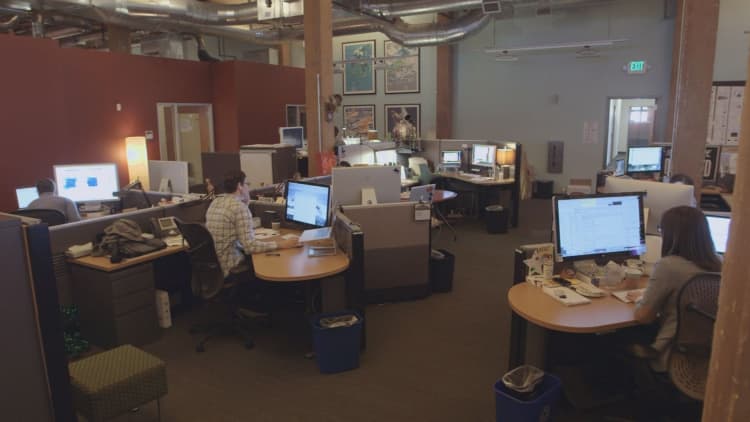
Nearly half of unemployed Americans have quit looking for work, and the numbers are even worse for the long-term jobless, according to a poll released Wednesday that paints a grim picture of the labor market.
Some 59 percent of those who have been out of work for two years or more say they have stopped looking, the Harris Poll of unemployed Americans showed. Overall, 43 percent of the jobless said they have given up, according to the poll released in conjunction with Express Employment Professionals, a job placement service.
"This is a tale of two economies," Express CEO Bob Funk said in a statement. "It's frightening to see this many people who could work say they have given up."
The results come just a few days after a government report showed that the unemployment rate fell to 4.7 percent in May, but the drop came primarily because of a sharp decline in the labor force participation rate. The number of people of all ages whom the government considers "not in the labor force" swelled by 664,000 to a record 94.7 million Americans, according to Labor Department data.
Job creation, after averaging more than 200,000 for much of the recovery, has slowed considerably this year. May saw just 38,000 new jobs, part of a trend in which payrolls have grown an average of 116,000 over the past three months and less than 150,000 for all of 2016.
The greatest concentration of unemployment is in the 18-29 age group, which comprises one-third of all the jobless:
Other highlights of the poll:
- 83 percent say economic benefits are skewed to the rich.
- 66 percent say they don't apply for minimum-wage jobs because the pay is too low.
- The unemployed are spending just 11.7 hours a week looking for work.
- More than half — 51 percent — say they haven't had a job interview since 2014.
- There's virtually no stand-out preference in the presidential race: 27 percent prefer presumptive Democratic nominee Hillary Clinton, while 23 percent favor likely Republican standard-bearer Donald Trump.
While much has been made over the decline in the labor force participation rate — at 62.6 percent, it is just off its lowest level since late 1977 — some economists think the fear is overdone. They argue that the drop is due in large part to an aging population, among other causes.
"Almost all of the decline that we've seen over the last decade or so is due to three factors: retiring baby boomers just leaving the labor force, college students getting more education than ever and disability," Andrew Chamberlain, chief economist at job placement site Glassdoor, said in an interview. "I don't think it's particularly worrisome."
There was one optimistic sign in the survey: 22 percent said the reason they are out of work is because they quit, up from 15 percent in 2014, a trend economists generally equate with a more mobile labor force.
The Harris/Express poll was conducted from May 5-16 and surveyed 1,513 jobless Americans, and carries a 95 percent confidence level.


